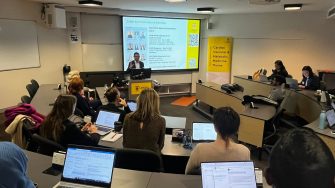Interactive Workshop for EMCRs: Maximising Research Impact
21 May, 10am-2pm
21 May, 10am-2pm

On Thursday 21 May, the CVMM ECR Committee hosted a special workshop tailored just for Early and Mid-Career researchers at UNSW.
Facilitated by the UNSW Research Strategy Office and UNSW Library team, the workshop was designed to enhance skills and knowledge in articulating research impact statements in funding applications and publications, as well as outlining several tools available to help track research impact.
The UNSW Library Team's presentation emphasized the importance of open access publishing and the utilization of UNSW Works for disseminating research. Researchers are encouraged to deposit their work, including journal articles and theses, into UNSW Works, which is freely accessible. Tools like SherpaRomeo and browser extensions such as LibKey Nomad and Unpaywall can assist in finding open versions of works. The UNSW Rights Retention Statement is crucial for ensuring the university's rights to openly publish the work, and it should be included in acknowledgments during publication. Outreach librarians are available for support, and tools like SciVal and Scopus can be used for benchmarking research impact.
The Research Strategy Office shared how they can assist researchers in navigating the grant application process, offering strategic advice for external grants. Researchers are encouraged to explore diverse funding options, such as mobility, travel, professional development, and research project grants, and to consider roles as collaborators.
The workshop featured two case studies: Dr Nona Farbehi from Graduate School of Biomedical Engineering and Dr Briar McKenzie from the George Institute for Global Health. Both emphasized that research impact is a broad concept, encompassing long-term contributions to the economy, environment, and culture, beyond academia. Grant applications should highlight various impacts, including social, economic, and health benefits, as well as contributions to decision-making, research capacity, and knowledge advancement.
Attendees were engaged in the interactive presentations, and suggested the examples and information shared will be beneficial to framing their applications and appearing more competitive to reviewers. To optimize chances of success, researchers should map their work to the fund's priorities and thoroughly understand the application requirements. This strategic approach ensures that the research not only meets the fund's criteria but also has the potential to make a significant, practical impact.
Researchers are advised to articulate their research process clearly, from inputs to outputs, user engagement, outcomes, and eventual impacts, focusing on depth rather than breadth within the word limit constraints. Overall, the session provided valuable insights into maximizing the visibility and impact of research through strategic use of open access resources and institutional support.